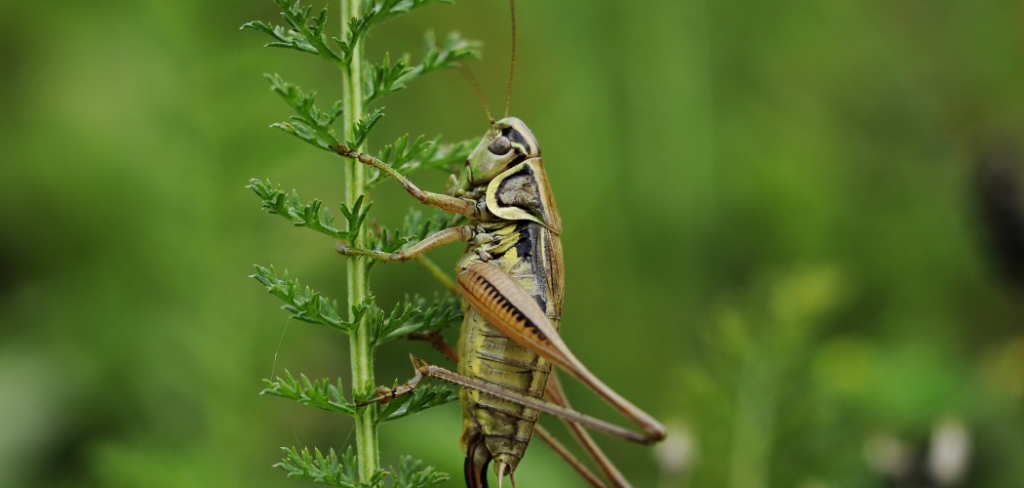It’s time for bed and you turn off the lights, tucked yourself in, and close your eyes. Then you begin to hear those chirps, not just from one source but it sounds like they’re everywhere. You try to block out the sound but you can’t. Why do crickets chirp? You ask yourself. Even as you try to locate the insect so you can squish it, you don’t hear it anymore. It is frustrating sometimes. Even when blindfolded, the sounds of crickets chirping would always alert you that it’s night time, especially if you live in areas with bushes. Every creature that moves has a means of communicating with members of their species. Only male crickets chirp, they make these sounds for different reasons. Different species of crickets have different chirping sounds.
Reasons Why Crickets Chirp: :
Male crickets produce sounds by stridulation. They produce these sounds by scraping their forewings together. When this sound is made, the wings of the crickets are elevated. Rubbing of the wings is called a pulse, and these pulse rates are impacted by some factors. Pulse rate and pattern of pulse differ with each cricket. Here are various reasons why crickets chirp especially at night.
1. Breeding
A cricket chirping isn’t just for mindless conversations with other crickets, mostly it’s for wooing female crickets. Crickets are nocturnal and they use sounds to navigate their nighttime dating calls. Breeding is one reason why they chirp in unison. They are not singing as a choir, they are in fact in competition with one another. They try to outdo one another by making their notes sound before the others.
Male crickets contest with other males to win the affection of the females. Some crickets are so crafty that they chirp from places that give off the best quality of sound. Female crickets then fly around listening for the best sound before choosing who to mate with.
Once the female approaches a male cricket, he immediately changes its sound to a softer one to convince her to stay. This is the courting song. Then after mating, the crickets have a special chirp of triumph.
Like other animals such as coyotes, crickets do make their unique sounds to communicate with other crickets to mate.
2. Dominance
Crickets also use songs to challenge males for territory. Once they notice that another male is trying to enter their territory, they chirp aggressively to ward off the intruder. This territorial dispute gives sounds that are very different from the mating chirps; both in speed and in intensity.
Another way a cricket establishes dominance is by being protective of their mates. If another male tries to woo an already mated female with a song, the mated male would sit beside the suitor and sing his own song. It’s funny if you think about insects fighting over a female cricket. This behavior is termed “satellite behavior”.
Do Crickets Chirp Faster In The Dark?
It might seem like crickets chirp faster in the dark, however, this is false. Crickets are nocturnal insects and they are more active at night. This means that during the day, most of them, if not all, are sleeping. The sounds seem faster at night because all crickets actively chirp at the same time, their sounds overlapping each other.
Also, temperature affects the way a cricket chirps. They tend to be more active and energetic when the temperature is high. If the cricket’s chirp sounds slow or dragged, it means the weather is cold. If its chirp is faster, then the temperature outside is warm.
Why Do Crickets Chirp Stops When You Come Close?
You’re trying to fall asleep but the sounds the crickets make won’t let you sleep, so you make up your mind that you’re going to kill the meddling insect. You wait for the sound and try to trace where it’s coming from. But as you get closer, you don’t hear the chirps anymore. If you don’t hear the chirps, you can’t find it. So why do crickets stop chirping when you get close to them?
Sensitive to vibrations and noise, crickets know when we come close to them. As you move, your body gives off vibrations that they feel and their survival instinct is to go quiet.
Predators can also hear the sounds male crickets make to attract females. These predators then attack unsuspecting crickets. Reptiles like toads and frogs would immediately eat their prey, a type of fly lays eggs on crickets. And after the eggs hatch, the larvae begin to feed on the crickets and then they die within a week.
Because crickets don’t have ears, they possess tympanal organs on their forewings. It vibrates in response to movements in the surrounding area. No matter how quietly you move, a cricket would surely feel the vibrations.
The solution to this is to stay still when the cricket goes quiet. When the cricket doesn’t feel vibrations anymore, it would think that the danger is gone and then starts chirping again. If you keep following this pattern, you’ll definitely find it.
How To Stop A Cricket From Chirping:
If crickets are in your room and you can’t sleep with the noise, here are some things you can do to help reduce the chirps
1. Light up the area
Crickets prefer darker environments because they feel safer there, being nocturnal creatures. Lighting up the room would definitely put a stop to the chirps.
2. Temperature
Turn down the heater, because crickets hate cold environments. It decreases their energy levels and make them sluggish.
Conclusion:
In some parts of the world, crickets are made as pets. Some people consider them as bringers of good luck. Most people just find chirps annoying.
Different species of crickets produce sounds called chirps. Only male crickets chirp. These sounds are used to attract mates, establish dominance, and to alert others of predators.
All creatures have means of communicating among other members of their species and no two cricket sound the same.
